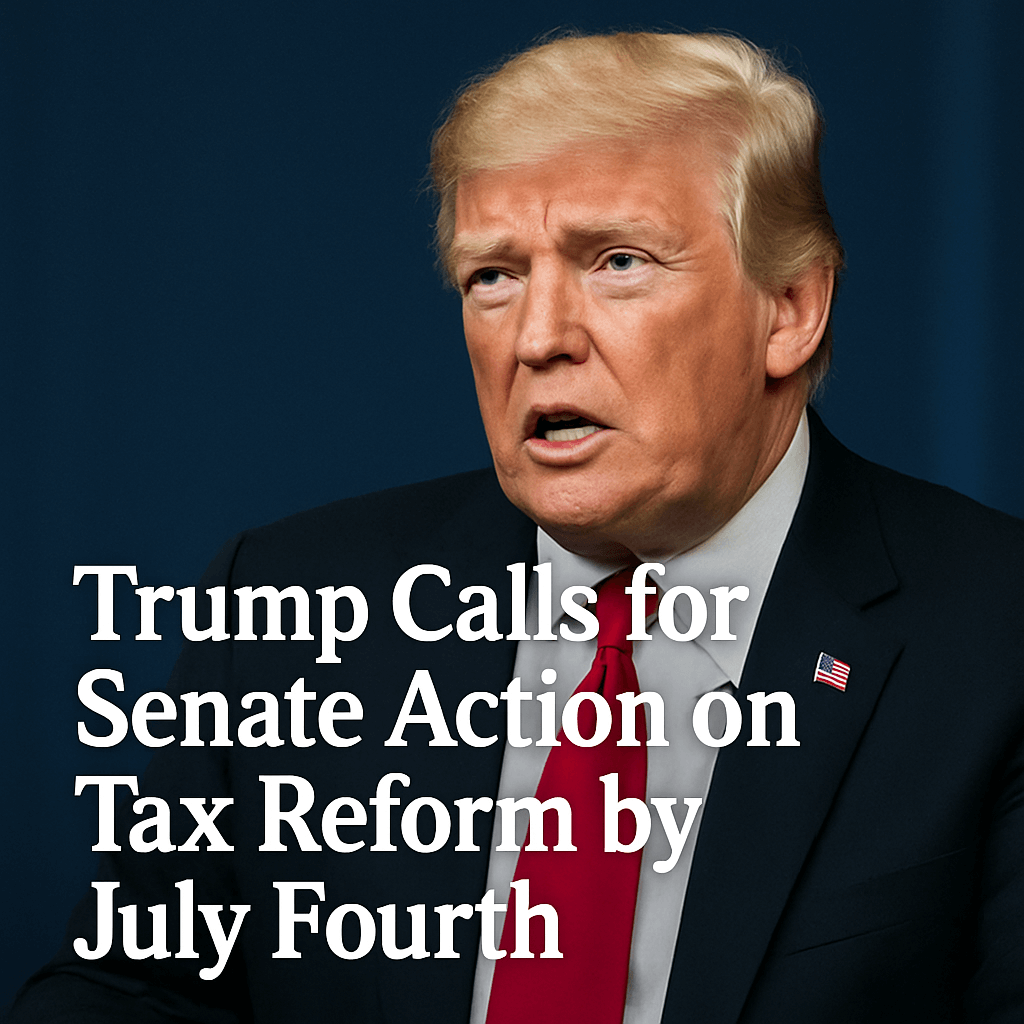Trump Calls for Senate Action on Tax Reform by July Fourth

President Donald Trump is intent on seeing his extensive tax reform bill—encompassing substantial tax breaks and spending cuts—finalized and ready for his signature by the Fourth of July. The administration is applying pressure on the Senate, which has seen a sluggish pace of work on the proposal, to expedite the legislative process.
Recent discussions between Trump and Senate Majority Leader John Thune reflect a concerted effort to overcome obstacles that have surfaced since the House narrowly passed the 1,000-page-plus bill by a single vote. According to Senator Josh Hawley (R-MO), Trump directly inquired about the prospects of the bill’s success, implying concerns over potential hurdles on the Senate floor.
Challenges Ahead for the Senate
The coming weeks represent a critical juncture for the Senate as members prepare to amend the bill, which has already sparked significant debate. With the House approving the bill amid concerns about its fiscal implications and benefits for wealthy Americans, Senate Republicans are preparing for discussions that will shape the proposed legislation’s final form. “Passing THE ONE, BIG, BEAUTIFUL BILL is a Historic Opportunity to turn our Country around,” Trump asserted on social media, encouraging senators to expedite their work.
However, not all feedback is positive. Notably, billionaire entrepreneur Elon Musk has publicly criticized the bill, labeling it a “disgusting abomination” on his social media platform, X. Musk’s remarks resonate with some lawmakers who have expressed apprehensions over the tax cuts, particularly regarding proposed reductions in funding for vital programs like Medicaid and SNAP (Supplemental Nutrition Assistance Program).
Senate Dynamics and Market Reactions
Senate Majority Leader Thune and House Speaker Mike Johnson face pressure from their Republican caucus, where every vote counts in the Senate’s slim 53-seat majority. Some senators are resistant to elements of the bill that propose significant cuts to social programs intended to finance $4.5 trillion in proposed tax cuts, leading to potential backlash in town halls back in their home states. “Individual members are going to stake out their positions,” Thune stated, emphasizing the importance of success as a mandate.
- Tax Provisions: The tax reform package seeks to extend tax cuts from the 2017 legislation and introduce new provisions, such as exemptions on gratuities.
- Social Program Cuts: To offset revenue loss from tax cuts, the bill proposes reducing federal expenditures by tightening eligibility for government safety net services.
- Debt Ceiling Increase: The proposal includes raising the nation’s debt limit by $4 trillion to permit additional borrowing to meet fiscal obligations.
Criticism from the Left and Budgetary Analysis
Democrats are vocally opposing the proposed tax cuts, which they argue primarily favor the wealthiest Americans at the expense of essential public services. Senate Democratic Leader Chuck Schumer articulated that the bill is “ugly to its very core,” urging colleagues to heed Musk’s critique of the legislation. Schumer claimed that the core structures of the bill would redirect funds away from public welfare programs toward tax cuts benefiting the ultra-wealthy.
The Congressional Budget Office (CBO) is expected to release an evaluation detailing how the bill could impact government revenues and expenditures. However, Republicans are likely to dismiss CBO assessments that portray the bill negatively as flawed, indicating a contentious interpretative battle may ensue.
Internal Party Tensions
As the deadline approaches, divisions within the Republican Party have become increasingly apparent. Trump has criticized Republican dissenters such as Senator Rand Paul, who remains concerned about the proposed $4 trillion increase to the debt ceiling within the package. Paula called into question the overarching spending measures, expressing his apprehension about abandoning the conservative fiscal principles that originally shaped his politics.
Despite Trump’s criticisms, Paul maintained his stance, emphasizing, “I can’t in good conscience give up every principle that I stand for.” The urgency of the situation is further underscored by Treasury Secretary Scott Bessent, who warned that failure to raise the debt ceiling could lead to a financial crisis as the nation’s ability to meet its obligations halts.
Amidst these discussions, compromises among senators are underway. Proposals to amend some of Trump’s tax breaks, such as changes to the $40,000 cap on state and local tax (SALT) deductions, are under review—balancing the interests of high-tax states like New York and California against broader conservative fiscal goals.
Conclusion
As the Senate prepares for an intense lobbying effort to pass the tax reform bill, both external criticism and internal dissent represent significant hurdles. The outcome of this legislative push, particularly its implications for both fiscal policy and social programs, will carry long-term ramifications for American taxpayers and the national economy.
Source: fortune